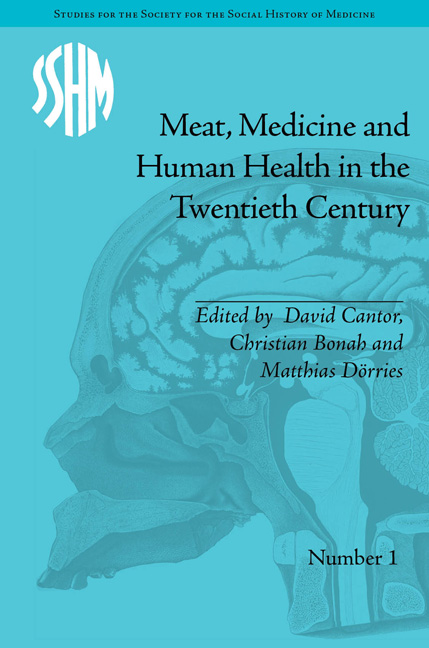Book contents
- Frontmatter
- CONTENTS
- Acknowledgements
- List of Contributors
- List of Figures and Tables
- Introduction
- Part 1 Meat and Therapeutics
- Part II Meat, Politics and Culture
- 4 What's Meatpacking got to do with Worker and Community Health?
- 5 Is Refrigerated Meat Healthy? Mexico Encounters the Chicago Meatpacking ‘Jungle’, c. 1910
- 6 Confused Messages: Meat, Civilization, and Cancer Education in the Early Twentieth Century
- 7 What's for Dinner? Science and the Ideology of Meat in Twentieth-Century US Culture
- 8 Vegetarianism, Meat and Life Reform in Early Twentieth-Century Germany and their Fate in the ‘Third Reich’
- Part III Meat, Risk and Regulation
- Notes
- Index
8 - Vegetarianism, Meat and Life Reform in Early Twentieth-Century Germany and their Fate in the ‘Third Reich’
from Part II - Meat, Politics and Culture
- Frontmatter
- CONTENTS
- Acknowledgements
- List of Contributors
- List of Figures and Tables
- Introduction
- Part 1 Meat and Therapeutics
- Part II Meat, Politics and Culture
- 4 What's Meatpacking got to do with Worker and Community Health?
- 5 Is Refrigerated Meat Healthy? Mexico Encounters the Chicago Meatpacking ‘Jungle’, c. 1910
- 6 Confused Messages: Meat, Civilization, and Cancer Education in the Early Twentieth Century
- 7 What's for Dinner? Science and the Ideology of Meat in Twentieth-Century US Culture
- 8 Vegetarianism, Meat and Life Reform in Early Twentieth-Century Germany and their Fate in the ‘Third Reich’
- Part III Meat, Risk and Regulation
- Notes
- Index
Summary
It is well known that Hitler regarded himself as a vegetarian, and described himself as such. Albert Speer, for example, reported that Hitler opposed the hunt, regarding it as a relic of the feudal world. Hitler was also known to describe meat eaters as ‘corpse eaters’ and meat broth as ‘corpse tea’, and often ordered his personal chef to prepare him separate vegetarian dishes even as his retinue dined on schnitzel and goulash. Henry Picker's account of Hitler's Table Talks testifies to the fact that Hitler was not motivated purely by health concerns. Indeed, in his recorded dinnertime conversations with his followers, held at the Führer's headquarters, Hitler also was known to have reflected upon the historical development of contemporary eating and dietary habits, and to have debated whether herbivorous animals were better suited to tasks of physical endurance. He also reported on the positive personal effects he experienced as a result of his vegetarian diet, claiming that after switching to a strictly meatless diet, he no longer sweated as profusely while delivering speeches at major rallies. Only later, after his health began to deteriorate, did Hitler begin to mention stomach complaints in his discussions of vegetarianism. In one instance, he is recorded to have plaintively pointed to his vegetarian and very small plate, and complained, ‘How am I supposed to be able to survive on this? Just take a look!’
- Type
- Chapter
- Information
- Meat, Medicine and Human Health in the Twentieth Century , pp. 145 - 158Publisher: Pickering & ChattoFirst published in: 2014



